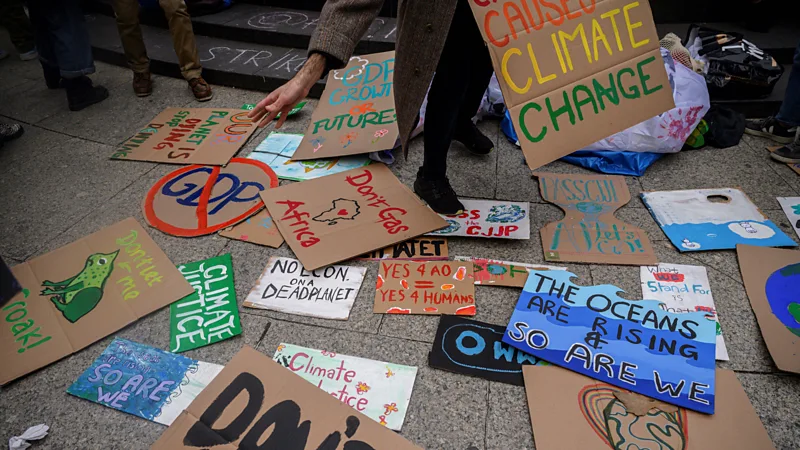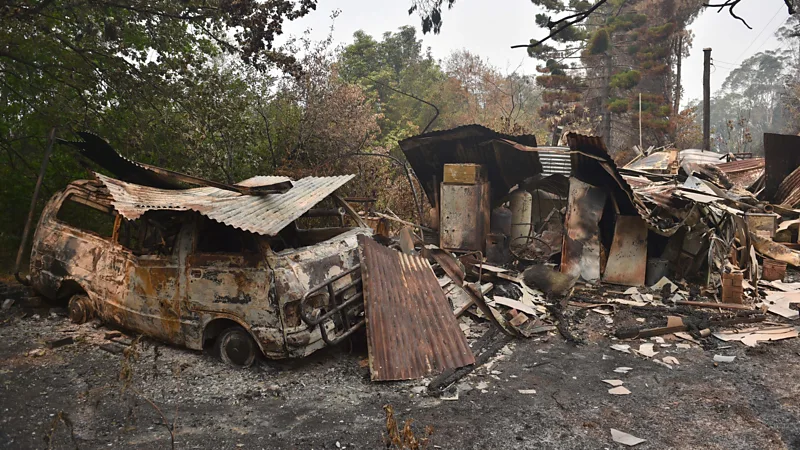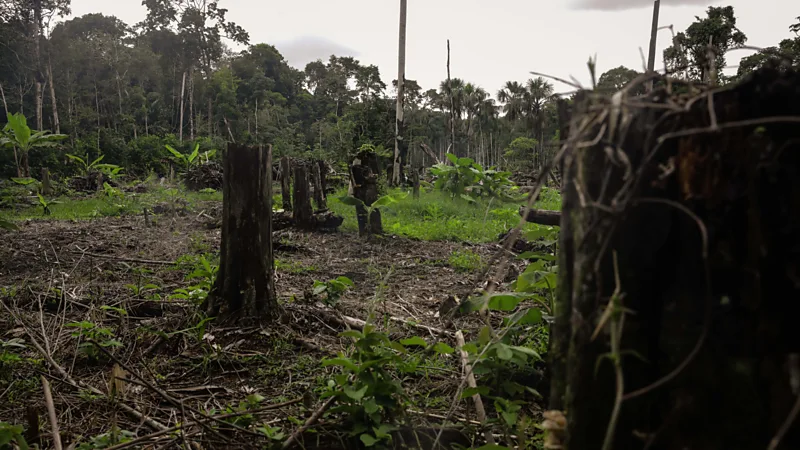The legal battles changing the course of climate change
 In 2015, Dutch government lawyers were faced with an unprecedented lawsuit accusing the state of failing to adequately protect its citizens from climate change. This legal action, initiated by the Dutch environmental advocacy group Urgenda, marked the beginning of a significant increase in climate litigation globally.
In 2015, Dutch government lawyers were faced with an unprecedented lawsuit accusing the state of failing to adequately protect its citizens from climate change. This legal action, initiated by the Dutch environmental advocacy group Urgenda, marked the beginning of a significant increase in climate litigation globally.
Since Urgenda's initial case, there has been a surge in lawsuits addressing various aspects of climate change, including inadequate government carbon reduction targets, corporate negligence, misinformation, and claims for climate-related damages. These legal challenges have spanned multiple jurisdictions and have been brought forth by a diverse range of plaintiffs.
A pivotal moment in climate litigation occurred in April 2024 when the European Court of Human Rights issued a landmark ruling in a case brought by a group of Swiss women. The Court determined that Switzerland had failed to take sufficient action on climate change, thereby violating the human rights of the women involved. This ruling underscored the growing recognition of climate change as a human rights issue and highlighted the potential for legal avenues to drive meaningful action on climate mitigation and adaptation.
More than 2,500 climate-related lawsuits have been documented worldwide, as reported by databases managed by Columbia University's Sabin Center for Climate Change Law. This surge in litigation is showing no signs of slowing down, indicating the enduring momentum of the climate litigation phenomenon.
These legal actions are not only reshaping public discourse around climate change but also prompting tangible shifts in government and corporate policies, regardless of their outcomes. According to a joint report by the Sabin Center and the UN Environment Programme (UNEP), this wave of litigation is establishing precedents for climate action on a global scale. In fact, the Intergovernmental Panel on Climate Change (IPCC) recognized litigation as one of the key mechanisms influencing climate policy in its 2022 report.
Joana Setzer, an assistant professorial research fellow at the Grantham Research Institute on Climate Change and the Environment at the London School of Economics and Political Science (LSE), describes climate litigation as a truly global movement. Setzer expresses confidence in its positive impact, noting that it has evolved into a powerful force in shaping climate policy.
According to the latest annual report from the London School of Economics and Political Science (LSE), which examined 549 climate-related lawsuits outside the US where courts had rendered a decision, 55% of cases resulted in a climate-positive ruling. However, comparable analysis of case outcomes within the US is limited. Among these climate-positive rulings, the majority favored the claimant against either a company or a public authority. Importantly, some of these cases have had a discernible impact on public policy.
The after effects
 The landmark Urgenda case resulted in significant changes in the Netherlands' climate policy. Following the ruling by the country's highest court, the Dutch government was mandated to reduce greenhouse gas emissions by a minimum of 25% by the end of 2020 compared to 1990 levels, deemed as the nation's equitable contribution to addressing the climate crisis. This decision prompted the Netherlands to elevate its climate action targets and explicitly incorporate "Urgenda" measures into its national budget for 2022.
The landmark Urgenda case resulted in significant changes in the Netherlands' climate policy. Following the ruling by the country's highest court, the Dutch government was mandated to reduce greenhouse gas emissions by a minimum of 25% by the end of 2020 compared to 1990 levels, deemed as the nation's equitable contribution to addressing the climate crisis. This decision prompted the Netherlands to elevate its climate action targets and explicitly incorporate "Urgenda" measures into its national budget for 2022.
A notable policy shift occurred in Australia when the New South Wales environmental watchdog unveiled its inaugural climate plan following pressure from bushfire survivors who argued that the agency was obligated to do so.
Legal actions have effectively halted specific polluting projects. For instance, in 2022, a Queensland court recommended rejecting Waratah Coal's expansive coal mine proposal in the Galilee Basin due to its "unacceptable climate change impacts," following a case initiated by a First Nations-led group of young activists. Consequently, environmental authorization for the project led by billionaire Clive Palmer was denied. Litigation also serves to insulate a country's climate policy from political turbulence. Although a far-right victory in the Netherlands' recent general election raised concerns about potential dilution of the nation's climate policy, the Urgenda ruling established a minimum standard for government obligations.
Sarah Mead, co-director of Urgenda's Climate Litigation Network, emphasizes that judges are well-suited to address such matters as they can independently evaluate whether governmental or corporate actions pose a hazard, unaffected by electoral dynamics.
Mead highlights that litigation can also prompt other institutions to confront the climate crisis. For example, in South Korea, where activists await the outcome of the nation's inaugural constitutional climate lawsuit, the Human Rights Commission has submitted a strong opinion to the court, condemning the country's greenhouse gas emissions reduction target as a violation of the rights of future generations.
Extent of influence
 Occasionally, a legal triumph extends its influence far beyond its initial jurisdiction.
Occasionally, a legal triumph extends its influence far beyond its initial jurisdiction.
For instance, a recent court decision in the US saw 16 young individuals successfully argue that the state of Montana had infringed upon their constitutional right to a "clean and healthful environment" by endorsing fossil fuel usage.
While this ruling pertained specifically to Montana's laws and doesn't establish a direct legal precedent elsewhere, legal scholars like Sarah Everhart from Widener University in Pennsylvania suggest that such developments are bolstering a movement in the US to incorporate environmentally friendly provisions into state constitutions. This not only clarifies governmental responsibilities but also furnishes activists with a more robust legal foundation to challenge inadequate climate action.
Similarly, the Dutch case has spurred numerous similar lawsuits filed in national courts globally, including in Germany, Belgium, Nepal, and Colombia. Despite these efforts, many cases still encounter setbacks, leaving campaigners to grapple with financial repercussions, risks to their reputation, and sometimes establishing unhelpful legal precedents. For instance, ClientEarth recently experienced a setback when its innovative attempt to sue Shell's board over the company's handling of climate risks was unsuccessful, resulting in significant legal expenses for the organization.
The enforcement issue
In the UK and Ireland, activists are resorting to legal action again, as they feel previous court rulings challenging government climate policies haven't been properly enforced. This highlights the complexity of the impact of litigation, which isn't always immediately positive.
Enforcement issues are also evident in Colombia, where despite a Supreme Court ruling in 2018 mandating government action to protect the Amazon, deforestation persisted until a change in leadership in 2022.  Nonetheless, even unsuccessful legal challenges can influence the discourse around climate action, potentially pushing decision-makers to reconsider their approaches, according to a report from the LSE.
Nonetheless, even unsuccessful legal challenges can influence the discourse around climate action, potentially pushing decision-makers to reconsider their approaches, according to a report from the LSE.
An illustrative case is that of Anjali Sharma, a teenager who didn't succeed in establishing a legal duty of care for young people regarding climate change protection by the Australian federal environment minister. Despite her legal setback, Sharma's efforts spurred independent senator David Pocock to propose a bill requiring governments to factor in the welfare of both current and future generations when making climate-related decisions.
Climate litigation serves as a tool to raise awareness about the climate crisis and empower civil society, according to experts. A YouGov poll conducted on behalf of the global civic group Avaaz demonstrated strong public support for a lawsuit brought by six young Portuguese individuals against 32 governments, which was heard at the European Court of Human Rights in late 2023. Although this particular case didn't succeed, another human rights climate case brought by a group of older Swiss women was recently decided in their favor by the same court.
In Ireland, the Irish Climate Case garnered over 12,000 signatures on a petition before achieving success at the Supreme Court in 2020. Clodagh Daly, the manager of Community Law & Mediation's Centre for Environmental Justice and closely involved in the case, noted that the final judgment galvanized climate activists in Ireland and lent legitimacy to their demands.
Changing the narrative
Litigation, according to Setzer, is seen as a potent tool for storytelling, capable of communicating the complexities of climate issues and their root causes more effectively than science alone.
Successful legal actions against governments have paved the way for lawsuits against corporations. Notably, Dutch NGO Milieudefensie's case against Shell resulted in a court ruling requiring Shell to slash its CO2 emissions by 45% compared to 2019 levels, a decision currently under appeal by the fossil fuel giant. Eline Zeilmaker, senior legal advisor for Milieudefensie, highlighted how the ruling reshaped climate crisis coverage in the Dutch media, emphasizing the crucial role corporations play and the urgency of action.
This landmark Shell case has inspired similar legal actions, including one against Italian oil major Eni, and even extended beyond the fossil fuel industry. For instance, an Indonesian island threatened by rising sea levels initiated legal proceedings against Swiss cement producer Holcim.
Legal challenges against greenwashing have also proven effective in driving tangible change. Earlier this year, European dairy company Arla Foods was barred from using the term "net zero climate footprint" in marketing its products in Sweden after a court found it misled consumers. Similarly, Austrian Airlines was mandated by a court to publicly admit it misled the public with adverts promoting CO2-neutral flights.
Campaigners assert that litigation not only aims to hold polluters accountable but also seeks to influence broader corporate behavior, with evidence suggesting such shifts are occurring. Following the success of the Shell case, Milieudefensie threatened legal action against 29 multinational corporations unless they published ambitious climate plans. Subsequently,
Dutch retailer Ahold Delhaize significantly increased its target to cut CO2 emissions, particularly aiming for a 45% reduction in emissions from its supermarket brand Albert Heijn's supply chain by 2030 compared to 2018 levels, up from the previous goal of 15%. Ahold Delhaize maintains that its heightened ambition was unrelated to Milieudefensie's campaign and was already in line with evolving climate science.
Milieudefensie has intensified its pressure on corporations by identifying five financial institutions as potential targets for litigation.
Ingrid Gubbay, European head of human rights and environmental law at law firm Hausfeld, underscores that litigation has significantly influenced corporate climate risk management, causing ripple effects in both the private sector and policymaking circles.
Research conducted by the LSE reveals that litigation presents a tangible financial risk to fossil fuel companies, resulting in a decline in their share prices. Following cases against major carbon-emitting entities, including energy, utility, and materials firms, their relative market value dropped by an average of 0.57% after litigation was initiated and by 1.5% following an unfavorable judgment.
While there is currently no published research examining the long-term effects of climate litigation on corporate valuation, nor evidence of significant changes to business models among major fossil fuel companies, recent developments suggest some shifts. For instance, Shell abandoned a production-cutting target set in 2021 well ahead of schedule. Shell explains to the BBC that this decision was prompted by the early achievement of its production reduction goal for 2030.
Despite potentially modest declines in share prices, such outcomes carry substantial implications for investors, banks, and companies due to the associated financial and reputational costs, as noted by Setzer.





































